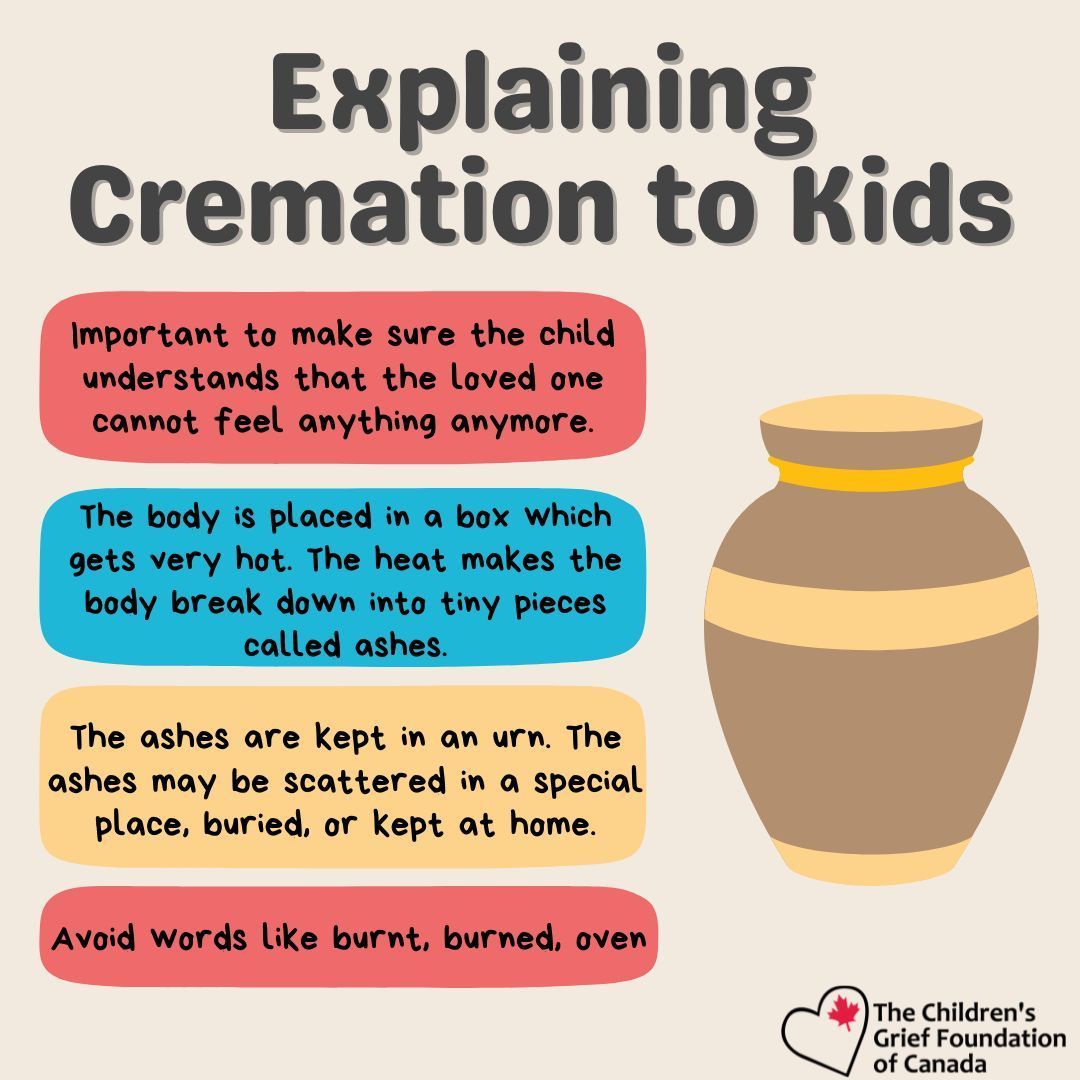One thing a young child becomes good at is a proficiency in asking questions. Almost as soon as a child is able to talk, "Why?" and "How come?" are among the most common inquiries. Many of these questions don't present a problem in giving answers. However, there are those that can give us trouble. When it comes to explaining death to a child, what can and should be said?
In the past, such questions were ignored with the belief that, among others, children should be protected from the harsh realities of death. Today, we are beginning to recognize that talking about death with a young child is a skill that we, as adults, need to learn. As we explain the beginning of life, so too must we be able to discuss its end.
Learning to accept death is a natural experience in life which must not be ignored. Talking about death is necessary. It is a vital part of every child’s development. Permitting the child to be part of the experience by attending the funeral and discussing the death helps to relieve their fears and anxiety. It can also provide mutual source of support.
Fear and mystery may be avoided by an honest explanation of death. Each time children inquire and are denied an honest response, they will use their imagination to create an answer. The longer such mysteries persist, the more difficult they are to correct.
SHOULD CHILDREN ATTEND THE VISITATION?
THE FUNERAL SERVICE AND THE CEMETERY?
Giving children the choice to be involved in the rituals of the visitation, the funeral service and the cemetery indicates that their role as a member of the family is valued and respected. If they are excluded from this choice, you may raise fears in their minds that you are hiding something from them or that they are not really included in the mourning process.
The reality of death is reinforced by viewing the body. This is as important for the child as it is for the adult. Arrangements can be made with the funeral director for private viewing time before visiting hours. This way, children may feel more comfortable and better able to express their feelings. They may also see that the emotions of the adults present are a natural expression.
The funeral is a ceremony which pays tribute to a life lived. The ability to understand the funeral service will vary according to the maturity of the child. Children should be encouraged to attend. If they decide they don't want to go, they will appreciate being asked. The decision must be theirs.
A final resting place provides a lasting memory. Being aware of this location helps children identify the whereabouts of the deceased. If children do not attend the cemetery the day of the funeral service, they may visit the resting place at a later date.
By attending the visitation, the funeral service and the cemetery, a child's questions may be answered. A drawing, a card or an action of tribute can help the child to be a part of the ceremonies. This can be a tremendously healing experience.
HOW SHOULD I EXPLAIN DEATH?
HONESTLY
Give a brief explanation and answer their questions honestly. Children shouldn't be told anything they will need to unlearn later. Don't use "beautiful lies" to shield children from death. Although the intent may be well meaning, if we are less than honest it adds to the child's confusion as he or she grows older.
In talking about death, children do not need to know every detail. Give only that information asked for or required.
SIMPLY
Too much information clouds a developing mind. Do not give more information than is required. Children have very short attention spans and a limit in retaining information. Use language the child can understand. Don't fear the words "death" and "dead."
LOVINGLY
Individual warmth and reassurance should be shared. For children, closeness and involvement confirm their world is still together and they will be cared for. Let children know that it is natural to feel sad. Don't hide your tears, Children need to know it is acceptable to cry.
WHEN?
General age grouping often indicates which aspects of death most concern the child. However, no two children are the same in their maturity and their ability to understand.
Age 2 - 4:
Children at two to four years of age have little understanding of the meaning of death. The death should be shared by explaining what has happened in simple terms.
Age 5 - 7:
At this age, children have a feeling for loss, but it is not easy to grasp. It must be explained to them. Let them know a death has taken place by allowing them to be present at the funeral home and the funeral service. Clinical studies show that denying a child the experience of sharing their loss through emotions may result in adjustment problems.
Age 8 - 10:
Children in this age group have a capacity to grasp life's mysteries. They will remember the experience vividly. Don't avoid letting them attend the service. They have emotions too. They should be expressed.
Age 11 - 12:
At this age, children know what death is. They will want to be helpful, as this allows them to resolve their own feelings of loss. Provide the opportunity for them to participate in the arrangements and service.
Age 13 - 10:
Clinical studies show that teenagers often have more intense grief than other age groups and may refrain from expressing it. Encourage friends to share their grief and attend the service. This gives them the support they need. They want to think of themselves as adults, so treat them as such.
Children are individuals and will react differently to death. However, most children will want to share in the funeral experience.
REMEMBER…
Just as a tree must be exposed to rain, snow and wind, children must also face the unfortunate aspects of life.
Dr. Wm. Lamers, Jr. Was asked, "At what age should a child attend a funeral?" He replied. "If the child is old enough to walk, let them walk with you into the funeral home; if not old enough to walk, carry them with you." There are many books and audiovisual aids available to help children understand death.
Contact us for more information and resources.
Source: Ontario Funeral Service Association. Vernon E. Gunckel, Ph.D.
Click Here For Video Series
Click Here For Kids Grief







